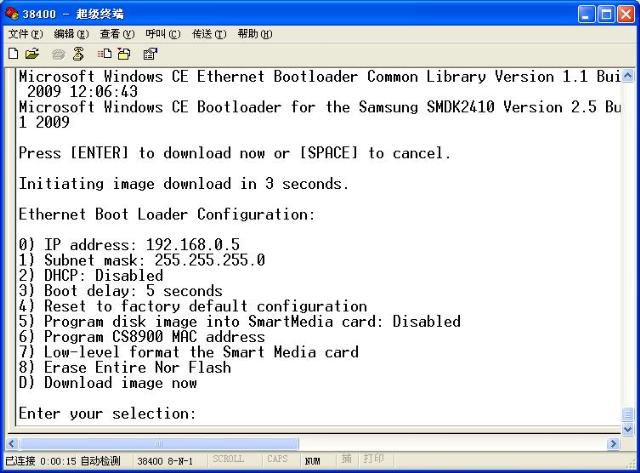WinCE5.0 SMDK2410 BSP在GEC2410开发板上的移植(2)-基于Nand Flash的Eboot
有了NBoot进行复制引导,Eboot就能运行在RAM中了,WinCE5.0自带SMDK2410 BSP与GEC2410硬件配置很接近,只要进行少量的修改就能运行在GEC2410上了。
一、开发环境
编译器: Platform Builder 5.0
目标板: GEC2410 S3C2410A,NAND Flash:64M K9F1208,NOR Flash:2M SST39VF1601 SDRAM 64M,CS8900
二、开始移植
1.Clone一个SMDK2410的BSP,并改名为GEC2410
2.GEC2410\src\bootloader\eboot\下为Eboot的代码,打开main.c,只有LCD和Eboot配置信息两块代码需要修改,网卡用的都是CS8900A,不需要修改,如果网卡不一样需要修改网卡驱动,网卡驱动在\WINCE500\PUBLIC\COMMON\OAK\DRIVERS\ETHDBG下
3.LCD驱动
由于LCD和原BSP中的不一样,相关参数需要修改,到板子自带的eboot中找到相应参数的数值
 InitDisplay
InitDisplay
1 static void InitDisplay(void)
2 {
3 volatile S3C2410X_IOPORT_REG *s2410IOP = (S3C2410X_IOPORT_REG *)OALPAtoVA(S3C2410X_BASE_REG_PA_IOPORT, FALSE);
4 volatile S3C2410X_LCD_REG *s2410LCD = (S3C2410X_LCD_REG *)OALPAtoVA(S3C2410X_BASE_REG_PA_LCD, FALSE);
5
6 // Set up the LCD controller registers to display a power-on bitmap image.
7 //
8 s2410IOP->GPCUP = 0xFFFFFFFF;
9 s2410IOP->GPCCON = 0xAAAA56A9;//0xAAAAAAAA
10
11 s2410IOP->GPDUP = 0xFFFFFFFF;
12 s2410IOP->GPDCON = 0xAAAAAAAA;
13
14 s2410LCD->LCDCON1 = (5 << 8) | /* VCLK = HCLK / ((CLKVAL + 1) * 2) -> About 7 Mhz */
15 (0 << 7) | /* 0 : Each Frame */
16 (3 << 5) | /* TFT LCD Pannel */
17 (12 << 1) | /* 16bpp Mode */
18 (0 << 0) ; /* Disable LCD Output */
19
20 s2410LCD->LCDCON2 = (2 << 24) | /* VBPD : 2 */
21 (LCD_LINEVAL_TFT << 14) | /* Vertical Size : 320 - 1 */
22 (2 << 6) | /* VFPD : 2 */
23 (4 << 0) ; /* VSPW : 4 */
24
25 s2410LCD->LCDCON3 = (8 << 19) | /* HBPD : 8 */
26 (LCD_HOZVAL_TFT << 8) | /* HOZVAL_TFT : 240 - 1 */
27 (8 << 0) ; /* HFPD : 8 */
28
29
30 s2410LCD->LCDCON4 = (LCD_MVAL << 8) | /* MVAL : 13 */
31 (6 << 0) ; /* HSPW : 6 */
32
33 s2410LCD->LCDCON5 = (0 << 12) | /* BPP24BL : LSB valid */
34 (1 << 11) | /* FRM565 MODE : 5:6:5 Format */
35 (0 << 10) | /* INVVCLK : VCLK Falling Edge */
36 (0 << 9) | /* INVVLINE : Inverted Polarity */
37 (0 << 8) | /* INVVFRAME : Inverted Polarity */
38 (0 << 7) | /* INVVD : Normal */
39 (0 << 6) | /* INVVDEN : Normal */
40 (0 << 5) | /* INVPWREN : Normal */
41 (0 << 4) | /* INVENDLINE : Normal */
42 (0 << 3) | /* PWREN : Disable PWREN */
43 (0 << 2) | /* ENLEND : Disable LEND signal */
44 (0 << 1) | /* BSWP : Swap Disable */
45 (1 << 0) ; /* HWSWP : Swap Enable */
46
47 s2410LCD->LCDSADDR1 = ((IMAGE_FRAMEBUFFER_DMA_BASE >> 22) << 21) |
48 ((M5D(IMAGE_FRAMEBUFFER_DMA_BASE >> 1)) << 0);
49
50 s2410LCD->LCDSADDR2 = M5D((IMAGE_FRAMEBUFFER_DMA_BASE + (LCD_XSIZE_TFT * LCD_YSIZE_TFT * 2)) >> 1);
51
52 s2410LCD->LCDSADDR3 = (((LCD_XSIZE_TFT - LCD_XSIZE_TFT) / 1) << 11) | (LCD_XSIZE_TFT / 1);
53
54 s2410LCD->LCDINTMSK |=3; // MASK LCD Sub Interrupt
55 s2410LCD->LPCSEL |= ~0x7;
56
57 s2410LCD->TPAL = 0x0;
58 s2410LCD->LCDCON1 |= 1;
59
60 // Display a bitmap image on the LCD...
61 //
62 memcpy((void *)IMAGE_FRAMEBUFFER_UA_BASE, ScreenBitmap, LCD_ARRAY_SIZE_TFT_16BIT);
63
64 }
这样Eboot就可以显示一副图片了,要是想减少Eboot的尺寸,LCD这块也可不要
4.Eboot 配置信息
(1)函数ResetBootConfig中有Eboot配置的初始信息
1 static void ResetBootConfig(PBOOT_CFG pBootCfg)
2 {
3 // Default eboot configuration values (leave the MAC address field alone)...
4 //
5 pBootCfg->Signature = CONFIG_SIGNATURE;
6 pBootCfg->VerMajor = EBOOT_VERSION_MAJOR;
7 pBootCfg->VerMinor = EBOOT_VERSION_MINOR;
8 pBootCfg->BootDelay = CONFIG_AUTOBOOT_DEFAULT_COUNT;
9 pBootCfg->ConfigFlags = CONFIG_FLAGS_AUTOBOOT;//not use DHCP CONFIG_FLAGS_DHCP;
10 pBootCfg->IPAddr = inet_addr("192.168.0.5");
11 pBootCfg->SubnetMask = inet_addr("255.255.255.0");
12 pBootCfg->LoadDeviceOrder = 0;
13
14 return;
15 }
(2)该信息保存在Flash中,由于Eboot目前保存在Nand Flash中,因此该信息也保存在Nand Flash中。
定义Eboot配置在Nand Flash中的位置大小,只需要一个Sector就可以了(512Bytes)
1 //EBOOT CONFIG IN NAND FLASH
2 #define EBOOT_CONFIG_BLOCK 19
3 #define EBOOT_CONFIG_SECTOR 19*32
4 #define EBOOT_CONFIG_SECTOR_SIZE 1
(3)原Eboot用的Nor Flash(AM29LV800),需要在OEMPlatformInit函数中注释掉AM29LV800_Init((UINT32)AMD_FLASH_START)的初始化函数
(4)实现ReadBootConfig和WriteBootConfig函数
我们用的NandFlash(K9F1208)的驱动已经有了,只需调用fmd下的flash读写函数即可。该库位于src\common\smartmedia\fmd\fmd.cpp
 ReadBootConfig
ReadBootConfig
1 static BOOL ReadBootConfig(PBOOT_CFG pBootCfg)
2 {
3 BOOLEAN bResult = FALSE;
4 char temp[512];//store EBOOT_CONFIG_SECTOR
5 OALMSG(OAL_FUNC, (TEXT("+ReadBootConfig.\r\n")));
6
7 // Valid caller buffer?
8 if (!pBootCfg)
9 {
10 OALMSG(OAL_ERROR, (TEXT("ERROR: Bad caller buffer.\r\n")));
11 goto CleanUp;
12 }
13
14 // Read settings from flash...
15 //
16 if (!FMD_ReadSector(EBOOT_CONFIG_SECTOR, (PBYTE)temp, NULL, EBOOT_CONFIG_SECTOR_SIZE))
17 {
18 OALMSG(OAL_ERROR, (TEXT("ERROR: Flash read failed.\r\n")));
19 goto CleanUp;
20 }
21 memcpy(pBootCfg,(PBOOT_CFG)temp,sizeof(BOOT_CFG));
22
23 // Check configuration signature...
24 //
25 if (pBootCfg->Signature != CONFIG_SIGNATURE)
26 {
27 OALMSG(OAL_WARN, (TEXT("WARNING: Boot configuration signature invalid - choosing defaults...\r\n")));
28 ResetBootConfig(pBootCfg);
29 WriteBootConfig(pBootCfg);
30 }
31
32 bResult = TRUE;
33
34 CleanUp:
35
36 OALMSG(OAL_FUNC, (TEXT("-ReadBootConfig\r\n")));
37
38 return(bResult);
39 }
 WriteBootConfig
WriteBootConfig
1 static BOOL WriteBootConfig(PBOOT_CFG pBootCfg)
2 {
3 BOOL bResult = FALSE;
4
5 OALMSG(OAL_FUNC, (TEXT("+WriteBootConfig.\r\n")));
6
7 if (!pBootCfg)
8 {
9 goto CleanUp;
10 }
11
12 // First, erase the eboot settings area in flash...
13 //
14 if (!FMD_EraseBlock(EBOOT_CONFIG_BLOCK))
15 {
16 OALMSG(OAL_ERROR, (TEXT("ERROR: WriteEbootConfig: Flash erase failed.\r\n")));
17 goto CleanUp;
18 }
19 // Write settings to flash...
20 //
21 if (!FMD_WriteSector(EBOOT_CONFIG_SECTOR, (PBYTE)pBootCfg, NULL,EBOOT_CONFIG_SECTOR_SIZE))
22 {
23 OALMSG(OAL_ERROR, (TEXT("ERROR: WriteEbootConfig: Flash write failed.\r\n")));
24 goto CleanUp;
25 }
26
27 bResult = TRUE;
28
29 CleanUp:
30 OALMSG(OAL_FUNC, (TEXT("-WriteBootConfig.\r\n")));
31 return(bResult);
32 }
5.Debug Serial
为了不与之后的内核中的串口驱动冲突,Eboot使用UART1 38400bps的串口输出
代码位于src\kernel\oal\debug.c
1 #ifdef UART1_38400
2 // GPH4 and GHP5 are UART1 Tx and Rx, respectively.
3 //
4 CLRREG32(&pIOPortReg->GPHCON, (3 << 8)|(3 << 10));
5 SETREG32(&pIOPortReg->GPHCON, (2 << 8)|(2 << 10));
6 // Disable pull-up on TXD1 and RXD1.
7 //
8 SETREG32(&pIOPortReg->GPHUP, (1 << 4)|(1 << 5));
9 // UART1 (TXD1 & RXD1) used for debug serial.
10 //
11 g_pUARTReg = (S3C2410X_UART_REG *)OALPAtoVA(S3C2410X_BASE_REG_PA_UART1, FALSE);
12 // Configure the UART.
13 //
14 OUTREG32(&g_pUARTReg->UFCON, BSP_UART1_UFCON);
15 OUTREG32(&g_pUARTReg->UMCON, BSP_UART1_UMCON);
16 OUTREG32(&g_pUARTReg->ULCON, BSP_UART1_ULCON);
17 OUTREG32(&g_pUARTReg->UCON, BSP_UART1_UCON);
18 OUTREG32(&g_pUARTReg->UBRDIV, BSP_UART1_UBRDIV);
19 #endif
三、移植结果




 浙公网安备 33010602011771号
浙公网安备 33010602011771号